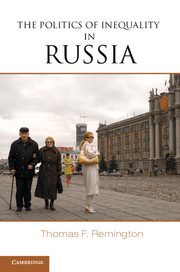Book contents
- Frontmatter
- Contents
- List of Figures
- List of Tables
- Preface
- 1 The Political Sources of Income Inequality in Russia
- 2 Employment, Earnings, and Welfare in the Russian Transition
- 3 Regime Diversity in the Russian Regions
- 4 Democracy and Inequality in the Russian Regions
- 5 Regional Regimes and the Labor Market: Evidence from the NOBUS Survey
- 6 Helping Hands or Grabbing Hands? Government-Business Relations in the Regions
- 7 Accounting for Regime Differences
- 8 After the Crash
- Index
- References
4 - Democracy and Inequality in the Russian Regions
Published online by Cambridge University Press: 05 June 2012
- Frontmatter
- Contents
- List of Figures
- List of Tables
- Preface
- 1 The Political Sources of Income Inequality in Russia
- 2 Employment, Earnings, and Welfare in the Russian Transition
- 3 Regime Diversity in the Russian Regions
- 4 Democracy and Inequality in the Russian Regions
- 5 Regional Regimes and the Labor Market: Evidence from the NOBUS Survey
- 6 Helping Hands or Grabbing Hands? Government-Business Relations in the Regions
- 7 Accounting for Regime Differences
- 8 After the Crash
- Index
- References
Summary
The previous chapters argued that Russian regional governors had substantial autonomy to develop institutional arrangements in response to the crisis and opportunity presented by the breakdown of the Soviet order. Some devised neopatrimonial, autarkic regimes, where the governor and his allies owned and controlled most major enterprises and used revenues from them to maintain themselves in power. Others established pluralistic regimes with coordinating institutions that distributed the risks and benefits of market adaptation among enterprises and government. Arrangements of the latter kind helped ensure that basic social stability was preserved (and that the cost of providing public services was shared broadly) while encouraging the pursuit of new investment and markets for local producers. The previous chapter presented six case histories of regimes illustrating these regime types. Most regional regimes combined neopatrimonial and pluralistic elements, and many regimes have shifted over time as a result of the succession of gubernatorial leadership. Moreover, even the most open, pluralistic regimes fall far short of the standards of liberal democracy. None, for example, has had a fully independent judiciary, a stable competitive party system, or (except sporadically) competitive elections capable of producing the alternation of leaders and opposition. The variation in scores reflects relative differences among the regimes in the degree to which they are open, pluralistic, and competitive. Still, the fact that these differences are significantly related to outcomes in the economy and society should alert us to the fact that dichotomous treatments of democracy may be less informative than continuous measures.
- Type
- Chapter
- Information
- The Politics of Inequality in Russia , pp. 110 - 134Publisher: Cambridge University PressPrint publication year: 2011



